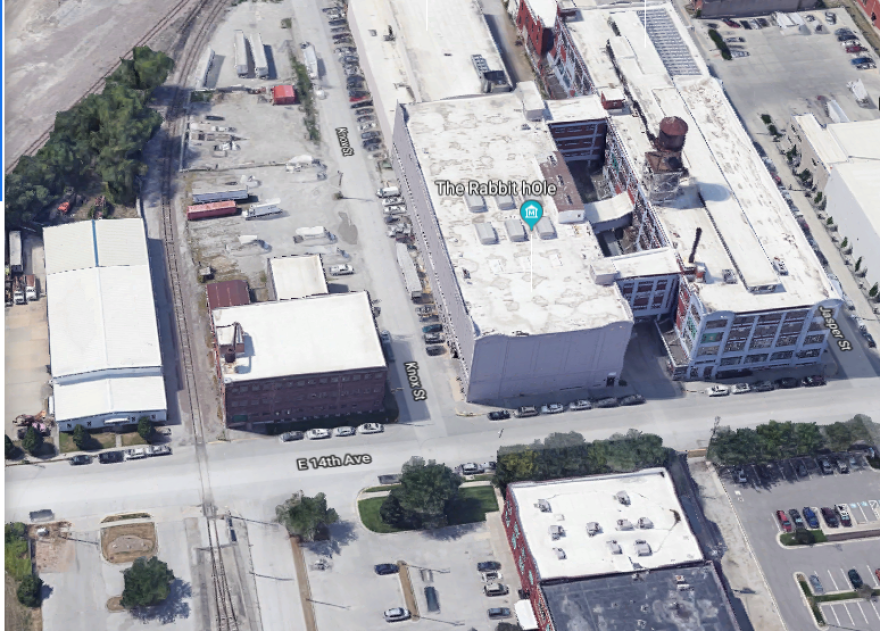Inside the Rabbit Hole, a national museum celebrating children's literature set to open in North Kansas City in 2020, visitors will encounter something unexpected.
Past the two-story front door, limestone steps will lead down into the burrow of a magical creature named Fox Rabbit.
"What we want to create is an environment where it is a suspension of disbelief, a magical space, and a beautiful space," says Debbie Pettid, who started the non-profit organization with her husband, Pete Cowdin. "And one that is really accessible."

In 2018, the Rabbit Hole bought a 165,000-square foot warehouse in North Kansas City, just north of downtown Kansas City, Missouri.
With more than half of their $12 million budget raised, staff has moved in, a fabrication shop is complete, and they're embarking on a second phase of construction this month. Plans call for activating the basement, first and second floors, in time for opening.
It marks the realization of a two-decade dream for the former owners of the beloved children's bookstore, the Reading Reptile, which closed in 2016.
"The building itself is like a book," says Cowdin. "We intend it to be a shared experience."
Now or never

The Reading Reptile opened in Westport in 1988 and later moved to Brookside. Pettid says they loved the community of people. But after nearly 30 years in business, Cowdin says, they were worn out by the retail environment.
They closed the store in 2016 to focus on the Rabbit Hole and creating a culture around children's literature.
"We had thought about this museum idea for probably 20 years," says Pettid, "and we were at this point in our lives, and in our profession, that we felt that it was just now or never."
They looked for inspiration in experiential places like the City Museum in St. Louis, which they'd visited with their five kids. That museum, founded by artists, re-uses industrial and architectural objects and features slides and climbers amid sculptural objects.
"Both Deb and I thought, wow, we could build something that was explorable and discoverable like that with a narrative and build it around children's books," Cowdin says.
Re-imagining a century of children's books

The Rabbit Hole plans on opening with at least 30 different exhibits, large and small. There will be permanent exhibits such as Max's room from "Where the Wild Things Are" and "the great green room" from "Goodnight Moon." Changing installations, called immersive storybook galleries — books you can walk inside — will rotate about every six months.
Though they're still in the process of confirming rights and permissions from authors or their estates, Pettid hints at a few of the books on their list.
"Like, 'Caps for Sale,' or Donald Crews's trilogy of 'Airplane,' 'Truck,' 'Harbor,' or Hardie Gramatky's 'Little Toot,' to John Scieszka's 'Escape Room.' So, really spanning an entire century of ideas."
They've tapped well-known works along with overlooked titles by people from diverse backgrounds. Decade-to-decade diversity, says Pettid, will be embedded in the Rabbit Hole experience.
"Publishing, children's book publishing, has been a very white activity, especially the century we're looking at: 1900 to 2000," she says. "But we are really committed and determined to create that diversity beginning in 1900. So that has required a lot of research."
Cowdin adds, "It's another great opportunity for the Rabbit Hole to step up."
'Building new exhibits forever'

The non-profit will build its exhibits on-site, where there's a fabrication shop, a foam carving and hard coating shop, a wood shop and a metal shop, among other facilities. Besides exhibits, the Rabbit Hole will also offer a makerspace, print shop, and a writing and story lab as well as a café and a bookstore.
"I would not call it a workforce. I'd call it a creative force," Cowdin says of all the employees this will require. "You know, we're really proud and privileged to build an organization that's really artist-driven and in an authentic way."
They are nearly a dozen staffers now, and it's likely they'll employing between 20 to 30 artists, designers, and fabricators.
"We want to create a culture that's really sustainable and really powerful and can have an impact," says Pettid. "It means that everybody who works with us is going to be able to know things about the exhibits that they're building, know things about those creators. There's that part of it. And just creating a really good team."
By having control and ownership over exhibit production, Cowdin says, they'll be able to create an institution where people will want to return.
"It enables us to create iterative designs. We can respond to the public, we can change exhibits, improve them, take them out entirely. Put new ones in," he says.
"We're going to be building new exhibits forever, you know. This is a life project and it's going to span generations."
Editor's note: Previously, we'd stated the Rabbit Hole would open in March 2020. That has been pushed back, so we changed wording to 2020.
Laura Spencer is an arts reporter at KCUR 89.3. You can reach her on Twitter at @lauraspencer.



